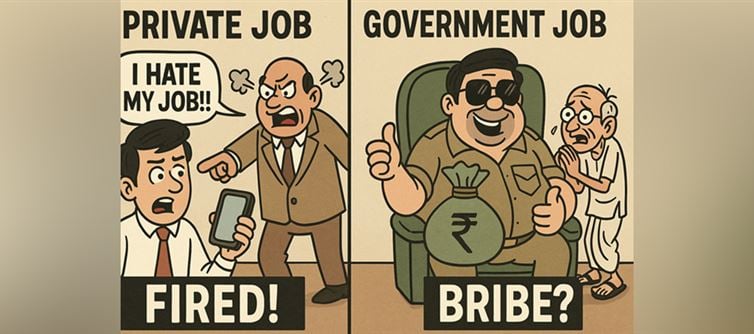
India has some of the strictest rules for ordinary citizens — students, freshers, employees, and private workers. Miss a class? Fail attendance. Take a second job? Fired. Speak openly about your workplace? Termination letter delivered at light speed. But those running the country — our elected representatives and high-ranking government officials — operate under an entirely different universe of rules. A universe where accountability is optional, attendance is irrelevant, conflict of interest is normal, and even serious misconduct floats away without consequence.
The contrast isn’t just striking.
It is absurd, unfair, and dangerously normalized.
1️⃣ Moonlighting Can Get a Coder Fired — But Ministers Can Run Companies on the Side
In private IT jobs, entry-level employees can’t take a second job. Not even a gig. Not even freelance. Do it once, and your ID card is deactivated before lunch.
But an elected representative — even a minister — can:
act in films
run companies
be a chairman
own businesses
influence policy that benefits their side-hustle
And the Constitution says: totally allowed.
A junior Python developer must give “100% dedication.”
A minister making policies for crores? Apparently, part-time is fine.
2️⃣ college students Need 75% Attendance — MPs Don’t Need 1%
students are barred from exams if they don’t meet attendance requirements.
But Members of Parliament?
They can skip:
entire sessions
entire years
entire terms
No salary cut.
No privilege cut.
No penalty.
They can shape the future of India…
without showing up even once.
3️⃣ Private Employees Lose Jobs for Long Leaves — government Employees Get Unlimited Protection
If an employee in a private firm takes 3–4 months off without medical or maternity grounds, HR will escort them out.
But government employees can:
Take “study leave” for years
travel abroad for exams
participate in activism
return whenever they want
And when they finally return?
Their job is waiting.
Sometimes, even with a promotion.
4️⃣ students Can’t Hold Two Placement Offers — But Aspirants Can Hold Entire government services Hostage
Top colleges cap placement offers to ensure fairness.
You accept one, you leave the rest for others.
But in India’s elite civil services?
You can:
qualify for a “lower” service
get training, salary, accommodation
Use that time to prepare again
attempt exam after exam
climb to the “top” service
Every year, one seat is blocked because someone “moved upwards” later.
Meritocracy is turned into a revolving door.
5️⃣ Private Sector Has Strict social media Rules — government Sector Has zero Boundaries
Private employees can’t post a single line about work.
But government officials?
They:
make reels
boast about duties
shame citizens online
run monetized YouTube channels
behave like celebrity cops
criticize the government
switch sides politically
return to service like nothing happened
The gap between rules for citizens and rules for officials is not just wide — it is lawless.
6️⃣ In Private Companies, Corruption and Misconduct Destroy Careers — In government, They’re Barely Offences
In the corporate world, corruption means:
jail
termination
blacklisting
In the indian government system?
Corruption charges—real, documented, proven—often result in:
transfer
paid suspension
reinstatement
medals
promotions
There are cases so absurd they would be unbelievable if they weren’t real — including officers with serious allegations receiving honours instead of punishment.
7️⃣ The 80-Year-Old Problem: Accountability Always Goes Downwards, Never Upwards
students face strict rules. Employees face strict rules.
But the people who run public systems?
The people who enforce these rules?
The people who write the laws?
They face none of the consequences they impose on others.
And because nobody has fixed this for nearly eight decades, the system continues to rot — predictably, painfully, openly.
🔥 Final Word
India isn’t suffering from a lack of talent, discipline, or ambition.
It is suffering from a system where rules are harshest for the powerless and loosest for the powerful.
If a nation truly wants good governance, it must flip this pyramid — accountability must rise upward, not fall downward.




 click and follow Indiaherald WhatsApp channel
click and follow Indiaherald WhatsApp channel